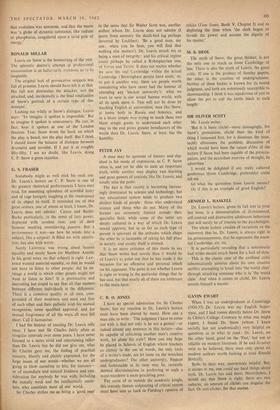G. 'S. FRASER Somebody might as well stick his neck
out. Dr. Leavis's lecture on C. P. Snow is one of thz greatest rhetorical performances I have ever read, for mounting splendour of scornful irony and of rage benignly laughing at the inadequacy of its object to itself. It reminded me of two great orators, one of whom at least, I know, Dr. Leavis does not admire: Cicero and Burke; Burke particularly, in the sense of lazy power, deployed with careless ease, and of dark humour masking smouldering passion. But a performance it was—see how he winds into a subject, like a serpent! It filled me with admira- tion, but also with terror.
Surely Lawrence was wrong_ about human equality and surely Snow (or Matthew Arnold, in his great essay on that subject) is right. Law- rence wanted material equality, so that he would not have to listen to other people; did he en- yisage a world in which other people might not want to listen to him? It is provocative and interesting but stupid to say that all that matters between different individuals is the difference. There is a common quality in all men, corn- pounded of their weakness and need and fear of each other and their pathetic wish for mutual recognition, some qualified approval, and for mutual forgiveness of all the ways all men fall short. Call it humanitas.
I had the honour of meeting Dr. Leavis only once; I have met Sir Charles fairly often at irregular intervals over some years. I have never listened to a more vivid and entertaining talker than Dr. Leavis but he did not give me, what Sir Charles gave me, the feeling of practical concern, bluntly and plainly expressed, for the large issues of our world—whether we are all going to blow ourselves to bits, for instance— or of immediate and natural kindness and con- sideration for anybody he was with, including the morally weak and the intellectually uncer- tain, who constitute most of our world.
Sir Charles strikes me es being a `good man' in the sense that Sir Walter Scott was, another author whom Dr. Leavis does not admire (I quote from memory the death-bed tag perhaps invented by Lockhart: 'Be a good man, my son: when you lie here, you will find that nothing else matters'). Dr. Leavis struck me as being a man of integrity: and his critical regime could perhaps be called a Robespierrian one, of Virtue and Terror. It does not matter whether we save the real Cambridge within the actual Cambridge ('Birmingham people have souls,' or, to put it another way, there are people worth considering who have never had the honour of attending any `ancient university"); what we want to save is our actual human world, with all its spots upon it. This will not be done by teaching English at universities; men like Snow, at home both in Russia and America, and in a blunt simple way trying to teach these two blunt simple giants to understand each other may in the end prove greater benefactors of the world than Dr. Leavis. Snow, at least, has the humility.


































 Previous page
Previous page